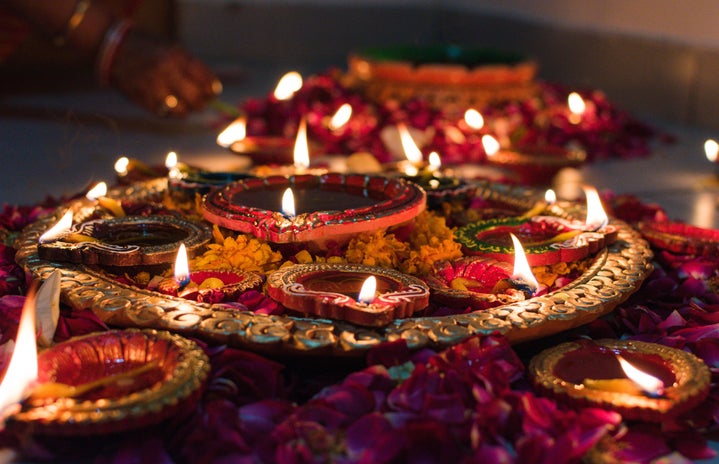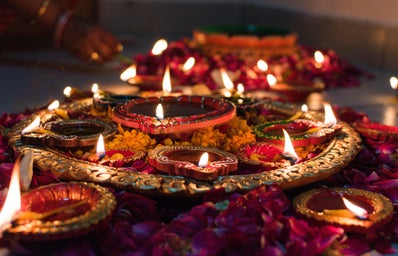Ever heard of the Festival of Lights?
Diwali, also known as the Festival of Lights, is India’s is biggest and most important religious festival of the year for Hindus. Think how important Christmas holidays are to Christians but in terms of Hindus and Diwali.
The name “Diwali” deprives from the Sanskrit term (ancient Indian language) deepavali which means “row of lights”, and is a five day festival, with the third day being the most important, essentially celebrating the victory of light over darkness, good over evil. Unlike Christmas, however, Diwali isn’t set on a single date and each year the date changes, usually falling in late October and early November, depending on the Indian Lunar calendar. However it is important that Diwali should fall on the day there is no moon.
Over the centuries, Diwali has grown to become a national festival that is also enjoyed by non-Hindu communities and other religions and cultures of India. The festival is celebrated for various reasons in each religion, but it is widely believed that the Goddess of Wealth, Laskmi, will enter our homes during this period and give us her blessing.
Diwali is known as the Festival of Lights because households in India and all over the world decorate their houses by lighting numerous candles around the house and making sure they stay lit the entire night.
Now, I’m sure you all are still very confused about Diwali and probably have a bunch of questions. Don’t worry, let me explain things better below.
1.What are the five days of Diwali?
As mentioned earlier, Diwali is a five day festival, usually falling somewhere in late October to early November, depending on the Indian lunar calendar. The third day is the most popularized and the most important day of the entire festival.
Day One: Day one is called Dhanteras ( Day of Fortune) and ideally people clean their homes and shop for gold or other good omens to bring good fortune into their homes.
Day Two: The second day is called Choti Diwali (Small Diwali) and homes are decorated with clay lamps and other traditional ornaments are used to decorate homes and prepare them for the Goddess of wealth to enter their homes.
Day three: This is the most important day of the festival, called Diwali. Families gather together for the Lakshmi Puja, a prayer to the Goddess of wealth, followed with large feasts and firework festivities and greetings. It is said that Lakshmi visits us home on this day.
Day Four: Day four is the Indian New year. This day, Indians all around the world celebrate the new year and visit relatives and friends with gifts and sweets for the new year.
Day Five: Day five is called Bhai Dooj, celebrating the bon between brother and sisters however this festival is not celebrated in every household.
2.Why is it celebrated however?
The story of Diwali does have quite a few tales however the most common and the most widely believed is the story of Ramayana, which dates back to 2,500 years ago. The day of Diwali marks the night Lord Ram returned to his kingdom of Ayodha after completing his 14 years of wrongful exile into the forest and after defeating the wicked king and demon Ravan. During his exile in the forest, King Ravan abducted Ram’s wife Sita and Ram then embarked on a long and challenging journey to rescue his wife. After defeating Ravan and saving Sita, Ram has completed his exile and returned back to his kingdom after 14 years.
The kingdom of Ayodha celebrated Ram’s return by illuminating the kingdom with earthen divas and distributing sweets all over. It is also said that Ram is the avatar of Lord Vishnu, one of the supreme gods in the Hindu religion.
3.Okay, but is it important that Diwali should fall on the night of a no moon?
Diwali is always celebrated on the night of a no moon. The reason being is that when Ram returned back to his kingdom after his banishment ended, there was no moon on that particular day and the residents of the kingdom and the palace lit the way with candles to welcome him and his wife back home.
Similarly, we continue to light up our houses with candles to welcome Lakshmi into our house.
4.Is it celebrated unanimously all over India?
Yes and No. Although Diwali is celebrated all over India, it is celebrated for different reasons in different religions. However Diwali still remains to be largely a Hindu festival and is also still largely celebrated for Ram’s victory over Ravan.
5.How do Indians prepare for Diwali?
Even though the festival of light is only for five days, preparations for Diwali start from a month ahead. Diwali is known as the time Indians clean their homes, from throwing out all unwanted items to sorting out items otherwise never touched the whole year around. This cleaning takes time and energy and hence gets started a month ahead. Diwali cleaning is taken very seriously is most households in India and is a very serious family affair.
Most mothers are found in the kitchen at this time of the year, cooking various, delicious traditional sweets for the family and relatives, as well as cooking other traditional snacks.
Diwali is also considered a holy time to start something new or embark on a new journey, and so many people buy their first homes around this time or start a new business venture. It is also considered a good time to buy expensive items such as gold, jewelry, electronic items, kitchen supplies and more.
It is also said that you should always wear new clothes and use new household items on Diwali, so many also enjoying splurging out on clothing items to wear during this time.
Next year, celebrate Diwali with us!


